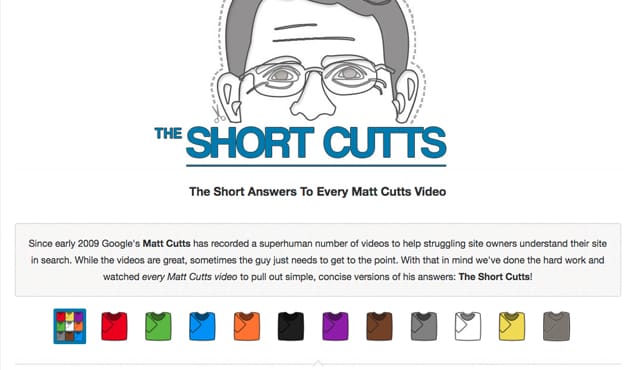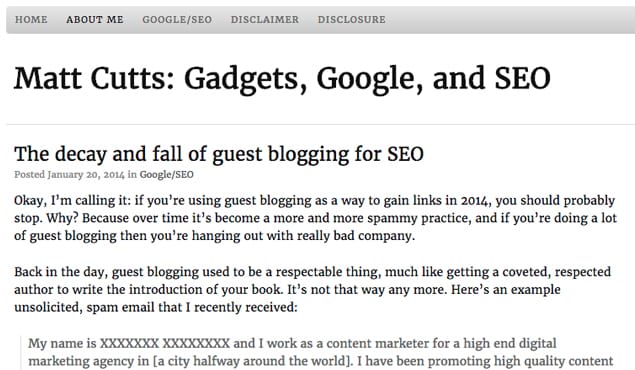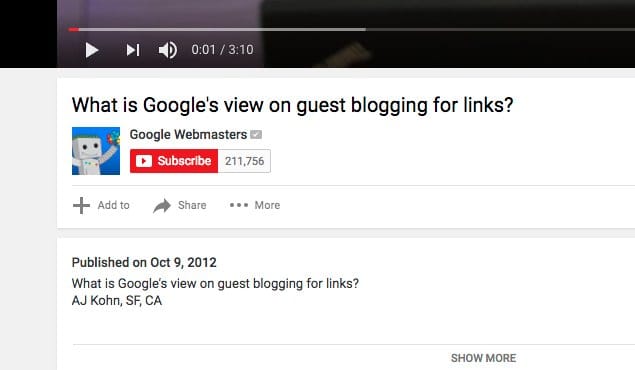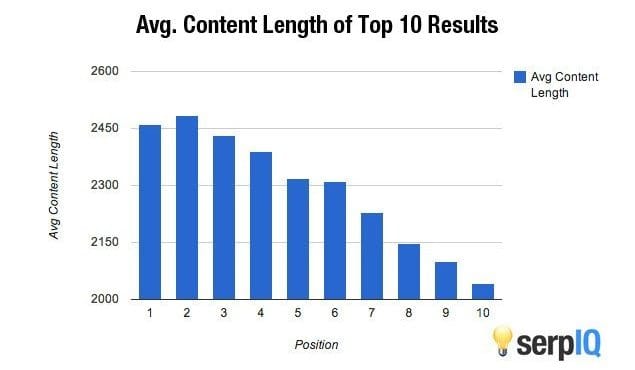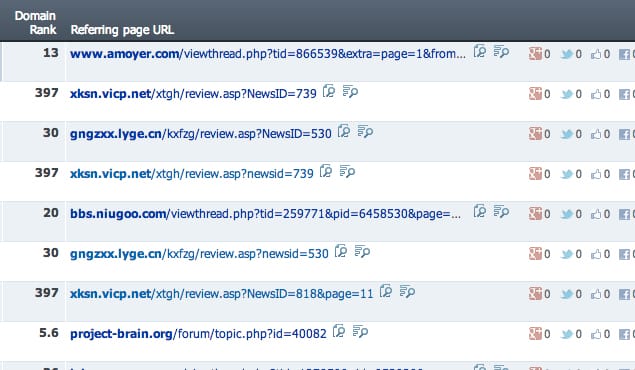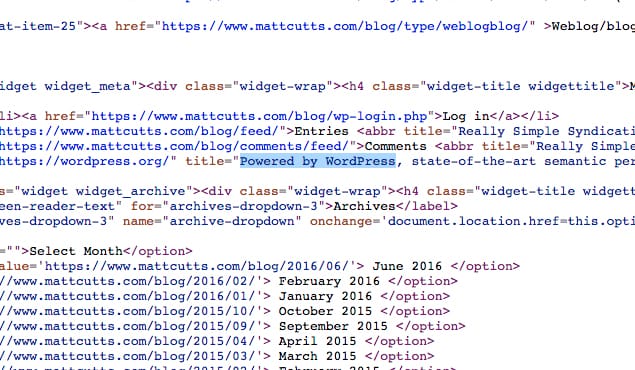“…Stick a fork in it; guest blogging is done.” That’s the inflammatory phrase penned by Matt Cutts in 2014 that sent the blog community into a frenzy of questions and fear. It sounds pretty harsh, even now, to call something so frequently used as entirely done — like an overcooked steak, like a slab of gritty meat.
I’ll get into the specific details of that post, which Cutts put up on his blog, below. I’ll also get into the varied list of facts, stats and concepts from Matt Cutts on guest blogging, a topic he was widely to be considered an expert on — at least from the Google side of things.
First, though, you need to know precisely who Matt Cutts is.
Who Is Matt Cutts?
Matt Cutts is the former head of the webspam team over at Google. He’s been an employee of the search giant since 2000, and wrote the first version of SafeSearch, the family filter that Google uses for clean-content searching.
The fact that he’s acted as the head of web spam means he mostly deals with curating a helpful, reliable, and spam-free search experience, often through the refinement of complex algorithms.
However, Cutts’ role also happens to mean that he’s a direct expert on most things related to search engine optimization (SEO). This is partly because web spam on Google has to do with search results and the myriad of complications that go into organizing those results, but it’s also because Cutts is a really informed person when it comes to all things web related.
In the past 10 years Google has shifted the prioritization of its SEO philosophy. There were certain techniques, like keyword stuffing, duplicate content, and paid links, that helped with SEO. Google has deemed those unethical to start (which was sort of always the case), but has also made them widely ineffective.
Or, in other words, spammy.
A large part of that shift has been thanks to Matt Cutts and his team, who have ushered in the relevant, content-rich age of search and Google.
His Videos
The part of Matt Cutts’ life at Google you should know about is his extensive dedication to short, helpful videos on all things search, spam, and website related. Google does not provide access to its algorithms or internal mechanisms for its search engine for obvious reasons, so the most that the populace of bloggers and marketers have to go on is trial and error, or help from the official team.
You can see every single one of Cutts’ videos on, along with a single sentence summary of each video, on The Short Cutts.
A number of them have to do with guest blogging, but the majority are about other aspects of search.
Guest Blogging with Matt Cutts
It should be no surprise to learn that Cutts has his own blog, which he updates pretty frequently. It’s a personal blog (as in, not officially associated with Google), but it ends up having a lot of insightful tips on web spam, SEO, and blogging itself.
While he has extensive reach and knowledge in other areas, guest blogging is one where’s he made a lot of noise. This is due to the inherent nature of spam issues in guest blogging, which I’ll get into more detail below.
The quote I posted at the start of this article comes from Cutts’ post “The decay and fall of guest blogging for SEO“. If that sounds bad, and exactly like the stick a fork in it comment, you’re right: it is.
This single post, released in January of 2014, signaled a large change in the guest blogging world. This change didn’t occur just because Matt Cutts said the industry was dead — in fact, guest blogging is not dead. It’s still very popular, active, and a great way to build a community.
However, Cutts did make it official in the sense that someone from Google was telling bloggers everywhere that the practices associated with less-than-trustworthy guest bloggers would be categorized as spam. This was true at the time in his own mind, but it was followed up by the powerful reach of Google, who laid down the law in a number of ways.
Google Penguin and Panda
One of the ways Google has combatted web spam is through the use of algorithm updates.
Google Penguin is one such algorithm, released in 2012, that has continued to be updated through the years. Its primary purpose is to trap websites that are using link farm practices, which basically means any sites that are buying links, creating other websites to point links to themselves, or some version of that.
Google Panda is another algorithm, released in 2011, that focuses on boosting the search rankings of websites that have high-quality content, and are thus “full” websites. That’s opposed to “low-quality” or “thin”, two words used by Google to reference the quality of content on a website.
Each of these algorithms was released before the Cutts’ article on guest blogging, but both of them tie in directly.
With the above in mind, it’s time to get into some of the nitty gritty reality. Guest blogging will always hold the altruistic potential of awesome content, but it has to be done correctly. If not, it will fall into the overdone steak category Cutts wrote about, and actually harm the search-ability of your site.
1. Who is the Author?
One of the first defenses that Cutts made for guest blogging practices was about authorship. Who is the author of your guest post? What are their qualifications?
While the answer to this doesn’t have a literal impact on your guest post, it should be pretty obvious that an excellent author will write a better post, carry more weight, and include all the things Google does care about when it comes to safe practices for content.
Cutts’ example (granted, back in 2011), was that if you’re accepting a guest blog from a well-known author you should absolutely publish it. Writers who have bylines on major websites in your niche are great for your website, assuming you can get them to write the article.
The writers don’t have to be well known, but where anonymity fails you’ll absolutely want quality. Google Panda was all about highlighting “full” websites — websites with lots of great content, which means relevant to readers.
A great author will produce a guest blog for you in that realm. A poor author, or a guest blog content farm, will not.
Lastly, think about what the author has to gain by posting on your blog, rather than their own or some other website. If the answer isn’t apparent, feel free to ask them. If something feels off, it might be.
2. Beware “unique, 100% original, authentic content.”
Another little nugget gleaned from Cutts’ extensive video series is really important.
How many emails have you received with guest blog offers that contain the words “unique,” “100% original” or “authentic” when talking about the article they will write for you?
While all of those things are necessary for an excellent guest blog post, the fact that the author is promising them to you in an email pitch is highly suspicious. This goes back to the “who is the author” question, and expands upon it.
The person emailing you may be an expert, but they may not be. They may be with a content creation team, a marketing service, or random in a foreign country trying to insert backlinks into some scam they’re running.
Watch out for these words.
3. Article Spinning
Along with those dangerous words, Cutts warns against anyone performing (or publishing) article spinning. This term basically refers to the process of tweaking, editing, or re-writing parts of published articles in order to publish them again.
A blog can do this for its own posts, and untrustworthy guest bloggers are known for spinning articles all the time. That sort of puts the “100% unique content” into perspective, right?
You’ll see large institutions doing a version of this — at the top of an article it will say “This article was published with slight changes in XYZ.com”. That’s article spinning, but because of the level of the institution they get away with it.
In reality, spinning is never good. It goes against everything Panda stands for — unique, full-bodied content that is relevant to users.
As a small blog, you won’t want to do it, and you’ll want to be careful about guest bloggers writing and pitching you content that has already been spun. This won’t be easy, as you’re not going to scour the web for similar content.
This is one of the main reasons Cutts warns against accepting guest bloggers you don’t know — how will you know if their content really is unique and authentic?
4. Word Count
Cutts said in the video I linked above that guest blogs of a lower quality typically are in the 200-400 word count range. That means the person (or company) is churning out short content at a fast rate, which is not what you want.
While it’s technically true that there is no word count minimum in Google’s algorithms, I’ve found that somewhere between 1200 and 2000 words is great.
You can find sites that have well-ranked articles with only 50 words, but notice the domains and authors. They are usually in the big league. Most bloggers reading this are not in the big league, they’re trying to crawl their way into the top 10 results on a Google search in a specific niche.
The reason for the large amount of words is that more words usually means more information, more in-depth insight, and more value for readers.
This isn’t always the case. You can have a ton of words that are mostly fluff — Google will see right through this.
Your goal should not be centered around word count, but rather how informative and helpful your article is. However, know that if you aim for longer informative content, Google will look at it with more value.
5. Off Topic
Another of Cutts’ video insights comes in the form of some sage advice: don’t accept guest posts that are off topic.
If you run a beekeeping website and someone emails you to write a post on moths, begin to wonder why. Why, exactly, has someone gone out of their way to email a bee website about expanding their content to include moths?
I’m sure if you prodded, the person would be willing to make it relate to bees, but that’s not what you want. You want premier experts in bees, beekeeping, and honey, right?
6. Overly Rich Keyword Anchor Text
Another aspect of spam that Cutts’ team has worked hard on, anchor text is the text that has a hyperlink attached to it. You can use keyword relevant anchor text, but it can go a little overboard.
For example, using the phrase “Matt Cutts’ post on guest blogging” tells the reader what is it about, while also highlighting keywords Matt Cutts and guest blogging.
What if the anchor text said: “Matt Cutts posts a SEO optimized article on how to guest blog effectively or not!”
The second example is terrible when it comes to grammar, over-uses “optimized” (it’s in the acronym as well as typed out), and capitalizes on “how to” “effectively” “post” and “article”.
Does that strange arrangement equate to a better sentence for your readers? No. It’s an overly rich keyword anchor text, the kind you need to steer clear of.
7. Quality of Links
The largest of Cutts’ advice, both in his videos, his posts, and the way he engineered the webspam protocol, has to do with links.
Hyperlinks in articles, when set as Dofollow, constitute as backlinks. You should know all this if you’re a blogger — if you don’t, it’s time to learn.
The main aspect of guest blogging that Cutts was railing upon in his 2014 post was how it had become spammy in its approach to links.
Guest bloggers email you because they want a byline, but more because they want to insert links into their article and get you to publish those links. This would give their website (or their affiliates or whomever they are working with) more link juice, and a higher ranking in Google.
This got so bad in 2014 (and still is in some circles) that it was equivalent to link farming.
So, you need to check every single link given to you by a guest blogger. Is it valuable, relevant, and from a trusted source? If not, delete it. Straight up. Why does your reader need it?
Then, after you’ve scoured, ask the guest blogger why they included such links, and if they don’t have a really, really good reason, don’t work with them. I know you want to publish content, but this is exactly the problem Cutts was talking about.
Don’t trick Google’s search algorithm to promote random guest bloggers. Not only will you piss off your readers, but Google can ding you for using spammy practices. At this point, the search giant has officially asked all blogs that publish guest posts to Nofollow every link in a guest post. Every link!
This isn’t always necessary, especially if the links are highly relevant. But you get the idea.
8. Guest Blog in Moderation
One of Cutts’ last pieces of advice on the topic of guest blogging is that you should be wary of someone who does this for a profession. Guest blogging not really a profession, because you first have to be an expert in something, right?
There are the few authors that are actually experts in guest blogging, but this doesn’t apply to most people.
Be cautious of people who can write in any topic, and say they guest blog as their main career. What about their own site? Why aren’t they writing for themselves?
The suspicions mount up, and you wonder what they’re getting out of it, especially since most guest blogging is done for free.
9. Use WordPress
Lastly, a pro-tip from the webspam, SEO pro himself: Cutts tells people concerned with SEO to use WordPress. He uses it himself.
The open-source blogging platform has tons of easy, free resources for optimizing your content, which is the best way to get noticed on the web.
Wrapping Up
Matt Cutts is a bit of a legend in the guest blogging community. He is not God, some refer to him as the devil, but many know of him and respect his opinion. He heads a major department at Google and has made a career of giving helpful, relevant advice to hordes of would-be bloggers, all so they can have a more optimized website.
Do you follow his advice?
 ContentPowered.com
ContentPowered.com


